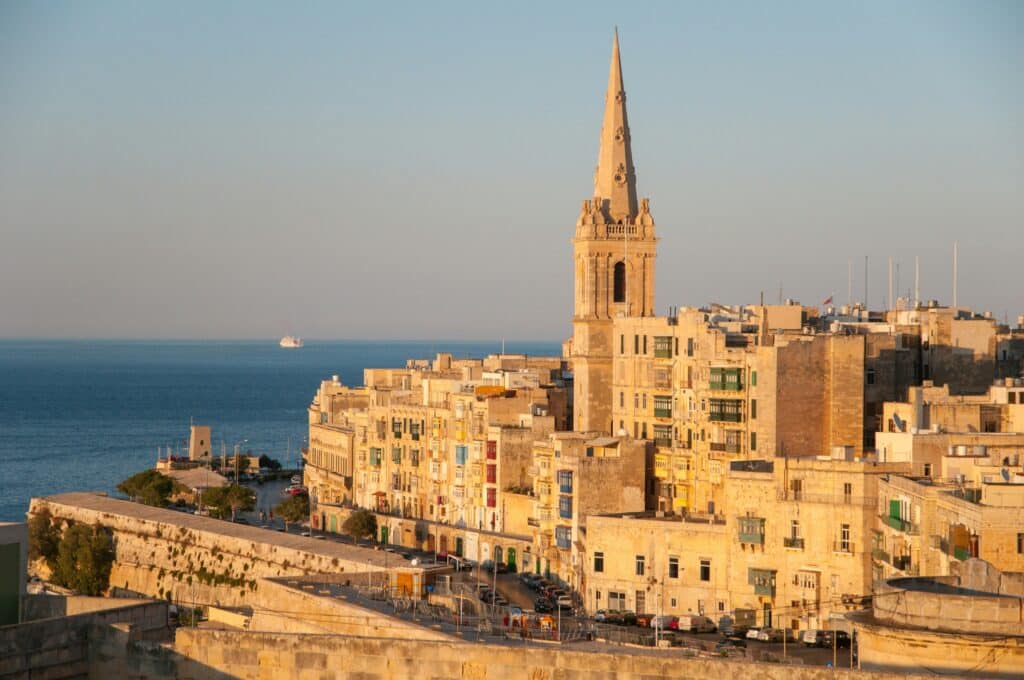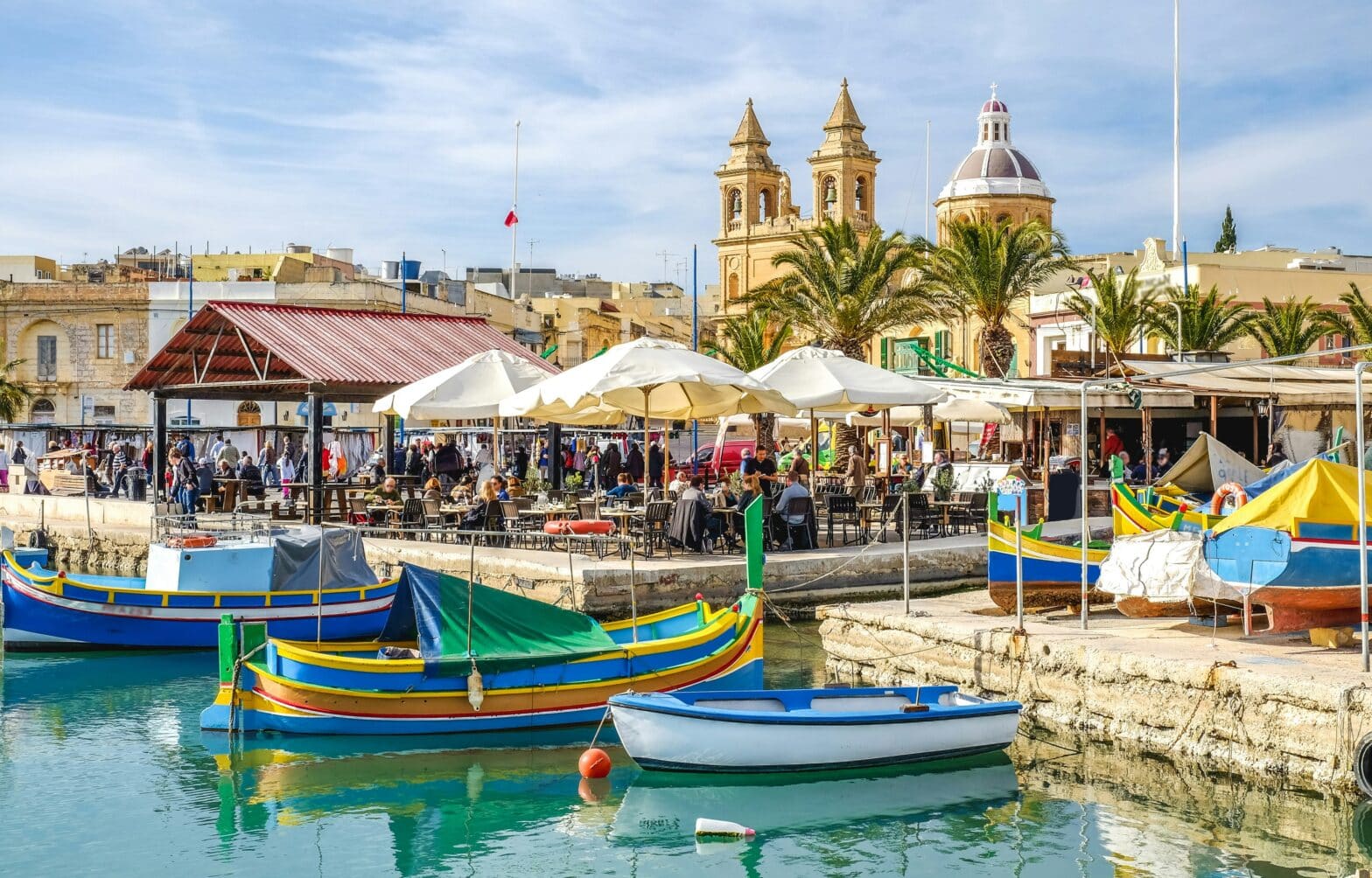Malta is a small island in the middle of the Mediterranean Sea. It became part of the European Union (EU) in 2004. Best amongst expatriates for the tax benefits it affords its inhabitants, namely a flat-rate income tax as well as various incentives for investors and entrepreneurs, it however has much more to offer and furthermore, the cost of living Malta offers its inhabitants is very affordable in comparison to other European countries. Malta’s sunny and agreeable Mediterranean climate, high quality of living standards, diverse and multicultural society, and not to forget the great job opportunities make living in Malta a favourite amongst expats, who seek permanent residence on the island state.
Exchange Rate and Cost of Living in Malta
The currency used in Malta is the Euro, with 1 Euro currently having an exchange rate of 1,09 to the USD, with no black market rate being available.
Malta – Europe:
In average, the cost living in Malta is about 40% less expensive than living in other European states such as Switzerland, Germany, France, Austria, Cyprus, the United Kingdom, Italy or Denmark and Sweden and similar European countries, while it is generally more expensive than some countries in eastern and southern Europe. The cost of living in Malta is on average 12% lower than the average cost of living in Europe.
Malta – United States:
Malta cost of living is about 35% cheaper if you compare cost living to the United States. The monthly rent sqft is about half of what you would spend in the estimated monthly costs for a comparable apartment in the Unites States.
The average budget required to live in Malta for a family of four is around 2.350 2.700 Euros, not including housing. As a single person or couple, you are looking at about 1.500 – 1.900 Euros to finance your life in Malta.
Rent prices in Malta
Depending on the area you are looking to rent in, the prices Malta offers vary. Currently, the rental market in Malta is especially competitive in highly sought-after areas like the city centre, Valletta, Sliema, and St. Julian’s, with Valletta living costs being especially high, making the cost of living in Valletta expensive when it comes to the housing market.

You can expect to spend between 800 and 1500 Euros on monthly rent for a one-bedroom apartment. Special features like a sea view and more rooms and square meters translate directly into higher prices, easily reaching 2500 Euros and more.
Less popular areas such as Mosta and Qormi boast more affordable rents and you can find a one-bedroom apartment starting from 600 -900 Euros. The rental market is very competitive and prices generally on the rise.
If you are living in a compound or apartment complex, be aware that there might be a maintenance fee for the building and surroundings.
Real Estate in Malta
If you are looking to buy real estate in Malta, be aware the price per square meter averages about 3.000 Euros, with prices starting around 1.500 Euros/sqm and reaching up to 5.000 Euros per sqm.
The Overheads of the Cost of Living in Malta
On top of these fixed costs of living, expect to pay the following overhead costs for electricity and water, etc. in Malta:
Electricity cost in Malta
0.20 – 0.25 Euros per kWh for residential consumers (with a monthly electricity bill between 50 to 100 Euros on average with discreet consumption).
Water
The monthly cost of water in Malta ranges on average between €20 to €40.
Gas bill
Bottled gas for cooking and heating is relatively wide-spread in Malta, with a typical 12kg gas bottle costing around 15 to 20 Euros.
Internet Services
Malta’s internet infrastructure is well-developped and provides high-speed internet services to residents. As everywhere else, the costs in Malta offers for internet depend on the provider, package, and speed, but you should budget 20 – 50 Euros per month for the package.
Food prices in Malta
Groceries
In 2024, food and groceries in Malta cost relatively affordable prices in comparison to many other European countries. According to Numbeo cost living prices are as follows for Malta:
- Water (1.5-liter bottle): €0.50 – €1.00
- White rice (1kg): €0.80 – €1.50
- Milk (1 liter): €0.90 – €1.50
- Eggs (12 units): €1.20 – €2.50
- Chicken fillets (1kg): €4.00 – €7.00
- Round of beef (1kg): €10.00 – €15.00

This is just a little overview, giving expatriates an idea some of the more common staples and what prices they need to expect to pay. As a family of four, expect to pay around 1000 Euros for groceries per month, as a single person around 400 Euros.
Cost of dining out in Malta
Cafes or casual restaurants: An inexpensive restaurant meal will cost between €10 to €20 per person, including a sandwich or salad for lunch, or main course and a drink.
Mid-range restaurant: The average cost for a meal in a decent restaurant ranges from €20 to €40 per person, including an appetizer, main course, and a beverage.
Fine dining: If your tastes lean towards gourmet cuisine expect an average cost of €40 to €100 or more per person for a multi-course meal with wine pairings. From budget friendly meals to real full-spread splurges, everything is possible in Malta.
Typical Maltese dishes and their prices
Malta’s cuisine is heavily influenced by a Mediterranean, Italian, and Middle Eastern flavour palette. Some popular local dishes and their prices include:
- Ftira: A traditional Maltese bread with various toppings such as tomatoes, olives, capers, tuna, and cheese. 5 to 10 Euros
- Pastizzi: pastries filled with ricotta cheese or peas. 0.50 to 1 Euro per piece
- Fenek: Rabbit Stew served with potatoes and/or vegetables. 10 to 20 Euros.
- Lampuki Pie: Lampuki (dolphin fish) pie is filled with fish, spinach, olives, and tomatoes. 8 to 15 Euros
- Bragioli: Beef olives stuffed with a mixture of breadcrumbs, bacon, and parsley, served in tomato sauce. 15 to 25 Euros
Education in Malta
Malta’s school system provides free public schooling for Maltese citizens and residents according to a European curriculum.
If you are interested in private or international schools, tuition fees may range from 5,000 to 15,000 Euros per year for primary education, or 8,000 to 20,000 Euros for secondary education.
Higher education tuition fees for international students can vary from 6,000 to 12,000 Euros per year for undergraduate programs and 7,000 to 15,000 Euros for postgraduate courses.

Malta Healthcare
The healthcare system in Malta is mostly funded through taxation. Expatriates living and working legally in Malta have access to both public and private healthcare services.
As an expatriate who is a EU/EEA nationals with insurance card you are entitled to receive emergency, necessary healthcare services at the same cost as Maltese citizens through the public healthcare system, but for everything else it would be a good idea to get international health insurance for expats.
And especially non-EU/EEA nationals should really think about getting private European health insurance or even better global health insurance with a renowned provider such as Foyer Global Health to cover medical expenses.
Costs for healthcare services in Malta
Normal doctor consultation: 20 – 40 Euro
Specialist: 30 – 60 Euro
Prescription medication: 5 – 15 Euros
Dental check-up: 30 – 50 Euro
Emergency room visit: 50 – 100 Euro (for non-residents without EHIC)
Leisure and Transport in Malta
Leisure activities in Malta
Malta offers a massive variety activities for people looking for entertainment options. The beautiful coastline beckons sun whorshippers to swim, snorkel, and sunbath at popular beaches like Mellieha Bay and Golden Bay.
Water sports like jet skiing and windsurfing are available for the more adventurous athletes, the incredible UNESCO World Heritage Sites like Valletta and Mdina are luring history buffy to their venues. Outdoor affecionados will be pleased to explore along the Dingli Cliffs, while cultural events and festivals throughout the year have an appeal to most people – the best-kown amongst them being the Malta International Arts Festiva.
In terms of costs, beach equipment rental typically ranges from 5 to 20 Euros per day. Jet skiing costs around 30 to 50 Euros per session. Entrance fees to museums and historical sites start from 5 to 15 Euros per person. Cover charges for nightlife venues range from 5 to 20 Euros, with cocktails priced at 5 to 10 Euros and beers around 3 to 5 Euros. Malta’s most popular beer is called Cisk and a beer liter bottle is not available. It comes in 25 cl bottles.
Public transport costs in Malta
Public transport in Malta is pretty affordable. In 2024, the following are approximate fares for bus travel:
Single Ticket: €1.50
Day Pass: €2.00
Weekly Pass: €21.00
Monthly Pass: €26.00
Discounts available for students, seniors, and persons with disabilities. Besides the public transport by bus, ferries to the neighbouring islands of Gozo and Comino are available, as are taxis and rental cars.
So, is Malta worth it?
Malta offers a great package for people that desire a high quality of living at a manageable price, as you get the best of many worlds: a rich history, vibrant cultural life, many activities and all that by the Mediterranean Sea with easy access and flights from all over Europe.
If you want to know more about expat health insurance in Malta, check out our different plans and get a free quote today:
